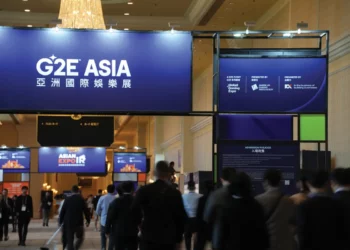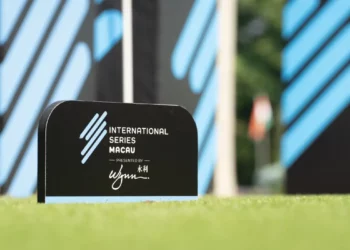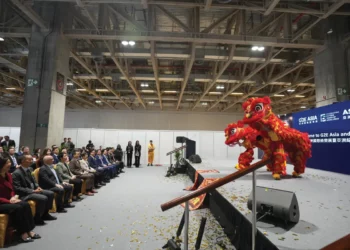Long established as the definitive list of the most influential figures and personalities in the regional industry, IAG’s Asian Gaming Power 50 celebrates its 17th anniversary in 2024.
It is now 16 years since Inside Asian Gaming first published the Asian Gaming Power 50, and it’s hard to believe just how far it has come as we arrive at our 17th Power 50 edition. Once a fun idea aimed at generating some interest, it has now become our most hotly anticipated publication of the year and with its very own glamorous black-tie dinner to boot.
After moving the Power 50 Black Tie Gala Dinner out of Macau for the very first time in 2022 due to the impact of the pandemic, we returned in 2023 after China (and Macau) finally dropped their zero-COVID policies. But the success of that 2022 show in Manila planted the seed, and we return to the Philippines this year at the nation’s newest integrated resort: Solaire Resort North in Quezon City.

The Power 50 began as a fun and innovative look at those who make our industry tick, but it has now evolved into an important annual insight anxiously awaited by all. Compiling the Asian Gaming Power 50 list is an intriguing, demanding, educational and exhausting task, yet one that comes with enormous responsibility, as the Power 50 has become the undisputed and definitive guide to the “big end of town.”
Ranking the big boys (and girls) from 1 to 50 is a difficult challenge at the best of times, but one made even more difficult given the enormous turmoil our industry has suffered during and since the pandemic. The economic impact of the pandemic has shifted the powerbase across much of the region, with Macau clearly the biggest loser while it rode out the COVID-zero storm. That saw some interesting changes to our Asian Gaming Power 50 list in recent years, with the Macau operators suffering the most as a result of massively impacted revenues and profits. That impact has, however, subsided and it has been terrific to see Macau soaring again, alongside the impressive years enjoyed by operators in Singapore, the Philippines and beyond. Australia, of course, is another story altogether!

Some of the biggest stories of the year have included the Macau rebound, the looming emergence of new gaming jurisdictions in Thailand and the UAE, the ban placed on the Philippines’ POGOs by President Ferdinand Marcos Jr and of course the contrasting fortunes of Crown and Star in Australia, with Crown returning to suitability in Victoria and NSW but Star fighting insolvency.
As always, with each headwind or tailwind our industry experiences, the impact on the Asian Gaming Power 50 is considerable.
HISTORY AND INDUSTRY GROWTH
The birth of the Asian Gaming Power 50 in 2008 coincided with an evolution in the region’s land-based casino industry, coming 12 months after The Venetian Macao opened its doors in 2007.
 Since then, a small parcel of land measuring just 7 square kilometres became the richest place on earth, now home to nine world-class integrated resorts: City of Dreams, Galaxy Macau, Grand Lisboa Palace, MGM Cotai, Studio City, The Londoner Macao, The Parisian Macao, The Venetian Macao and Wynn Palace.
Since then, a small parcel of land measuring just 7 square kilometres became the richest place on earth, now home to nine world-class integrated resorts: City of Dreams, Galaxy Macau, Grand Lisboa Palace, MGM Cotai, Studio City, The Londoner Macao, The Parisian Macao, The Venetian Macao and Wynn Palace.
This hugely successful Cotai integrated resort model spread like wildfire across the APAC region. In recent years the Philippines has been Asia’s fastest growing market, with its four Manila IRs – City of Dreams Manila, Solaire Resort & Casino, Okada Manila and Newport World Resorts (formerly Resorts World Manila) – along with Hann Casino Resort in Clark, and NUSTAR in Cebu making it a clear number 2 on the Asian gaming scene.
In Singapore, Resorts World Sentosa and Marina Bay Sands are now world-renowned landmarks and amongst the most profitable IRs in the world.
 In Cambodia, NagaWorld enjoys an effective monopoly, disregarding the multitude of small properties on the Thai and Vietnamese borders. However, its post-COVID recovery is slow and the massive US$3.5 billion Naga3 expansion has been delayed for years. Operator NagaCorp is also in the midst of a major transition period following the passing of its founder, Dr Chen Lip Keong, last December. The company is now in the hands of his sons, led by CEO Chen Yiy Fon.
In Cambodia, NagaWorld enjoys an effective monopoly, disregarding the multitude of small properties on the Thai and Vietnamese borders. However, its post-COVID recovery is slow and the massive US$3.5 billion Naga3 expansion has been delayed for years. Operator NagaCorp is also in the midst of a major transition period following the passing of its founder, Dr Chen Lip Keong, last December. The company is now in the hands of his sons, led by CEO Chen Yiy Fon.
Paradise City, Jeju Shinhwa World and Jeju Dream Tower and most recently Mohegan INSPIRE have introduced the integrated resort concept to Korea, although Kangwon Land remains the only casino in the country where locals are permitted to gamble.
Meanwhile, Vietnam is home to the nation’s first casino open to locals, Corona Resort & Casino, as well as The Grand Ho Tram Strip and Hoiana, the latter welcoming its first guests in mid-2020.
 Despite such incredible development across the APAC region, only four people have sat atop the Asian Gaming Power 50 over the past 14 years. They are Dr Stanley Ho, Lim Kok Thay, Sheldon Adelson and Francis Lui.
Despite such incredible development across the APAC region, only four people have sat atop the Asian Gaming Power 50 over the past 14 years. They are Dr Stanley Ho, Lim Kok Thay, Sheldon Adelson and Francis Lui.
CHANGE IS PERENNIAL
The Power 50 list is not a place for people to rest on their laurels. While company longevity and/or executive tenure is a small factor, the list predominantly focuses on the activities of the prior 12 months. It’s all about “what are you doing now?” and “what have you done lately?” not “what have you done in the last 16 years?” As such the Power 50 list is very dynamic as people move up, and down, and on, for a multitude of reasons.
A persistent phenomenon during the making of the list each year is the “My business has grown therefore I should move up the list” fallacy. The truth is everyone lifts in a rising tide. COVID aside, most people on the list are managing businesses that grow each year, and just to maintain a spot on the list requires annual growth. Someone doing the same thing year after year and achieving zero-growth results will slowly slip down the list as the years roll by.

HOW DOES THE JUDGING PANEL DETERMINE THE RANKINGS?
We have been asked this over and over across the years – and continue to be asked. Despite the fact we’ve explained it many times – let’s explain yet again!
Even though the judging panel has become quite adept at putting this list together over the years, the task of ranking industry leaders seems to get more complex as the Asian gaming industry matures and becomes more nuanced. How on earth does one compare the sole owner of a smaller property to the brand new “hired help” COO of a much larger one? How about comparing a large property that is still in pre-opening to a smaller one that has been active for years? The CEO of the Hong Kong Jockey Club versus the head of a private casino company versus the President of a casino chain in Korea that doesn’t have locals gaming? And how should online and offline gaming be compared? These are the types of tough questions the selection panel of the Asian Gaming Power 50 wrestles with every year.

As with any such ranked list, there are always criticisms and objections, usually from those who feel slighted. We often hear claims of not reading the list or not caring about it, but we are often sent messages, sometimes directly but more often through surrogates, bemoaning the injustice of a perceived lowly position and lobbying for the following year. Some lobby us to not be on the list as they feel it raises their profile too much. But no one ever contacts us to complain about being ranked too high!
The rankings include a numerical “Power Score” for each person on the list. The calculation of this score is a mix of science and art. Points arise from a number of factors including the GGR and Adjusted EBITDA of the person’s organization, a weighted dissection of those points between the top senior executives with key policy control of that organization, adjustments for whether the person is hired or has a major equity position, their length of tenure, how active in business initiatives the person has been in the prior 12 months, the long-term gaming pedigree of the person, the jurisdiction in which he or she operates and many more. Some factors are necessarily subjective, but we’ve always assigned a points value to strive for as much objectivity as possible.

We do all this without any predetermined idea of where any person should or should not be ranked.
At the end of the day, in our industry the concept of “power” generally comes down to direct or indirect control of money. The greater the GGR and EBITDA controlled, the greater the power. But it’s not all about those factors, many other factors also come into play in adjusting the final power score.
And what, exactly, is control? It’s about influence, it’s about who is the ultimate decision maker, and sometimes it’s simply about who is the person everyone in the room looks to for answers. In the same way that a country is a country because other countries say it is, some people are powerful simply because other people say they are.

Finally, I’d like to take this opportunity to thank my fellow judging panel members for their tireless work and excellent insights. And so, without any further ado, we present the 17th edition of the Asian Gaming Power 50. Enjoy!
Here are some other questions that have arisen during the selection process:
What countries count as Asia?
The Power 50 list covers the entire IAG APAC coverage region, which we define broadly as approximately one-third of the globe – from the Middle East to the International Date Line.
What about non-operators who have a strong voice in the industry, like regulators, media commentators, analysts, academics, suppliers, consultants, gaming lawyers and so on?
Over the years we have carefully considered the power wielded by leaders in these industry sectors and concluded firstly that it was impossible to include regulators (PAGCOR’s Alejandro Tengco earned his position on the list purely as an operator, not a regulator). Likewise, even taking the power of people in all the other sectors into account, it was only direct operators who made it into the top 50.
How do you pick between the owner/CEO and the COO of a company?
Many gaming companies have a charismatic and entrepreneurial owner/CEO and a perhaps more seasoned and level-headed gaming professional in charge as President and/or COO. By default, being an owner necessarily ranks many more Power Score points. After all, the owner can always force an appointed COO out of his job. But in some instances, a hired COO can effectively wield more power than their “boss” when the owner delegates a very large proportion of decision-making responsibility. The answer is decided on a case-by-case basis.
For the full list of 2024 Asian Gaming Power 50 winners, click here.































